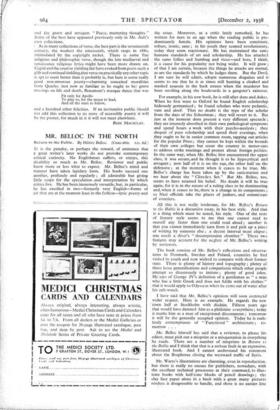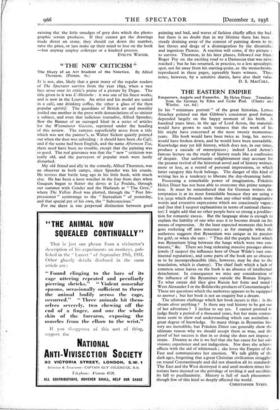MR. BELLOC IN THE NORTH Return to the Baltic. By
Hilaire Belloc. (Cons:able. x2s. 6d.)
IT is the penalty, or perhaps the reward, of eminence that a great writer's later works do not provoke contemporary critical curiosity. No Englishman suffers, or enjoys, this disability so much as Mr. Belloc. Reviewer and public know more or less what to expect. Mr. Belloc's mind and manner have taken lapidary form. His books succeed one another, profusely and regularly ; all admirable but giving little scope for the speculation _and interpretation by which critics live. He has been immensely versatile, but, in particular, he has excelled in two—formerly very English—forms of art that are at the moment least in the fashion—lyric poetry and
. the essay. Moreover, as a critic lately remarked, he has written for men in an age when the reading public is pre- dominantly female. His opinions have been consistent, robust, ironic, sane ; in his youth they seemed revolutionary, today they seem reactionary. He has maintained the same humane standards of art and scholarship. He has attacked the same follies and humbug and vices—and here, I think, is a cause for his popularity not being wider. It will grow ; ' of that I am certain, because the things he attacks are eternal, as are the standards by which he judges them. But the Devil, I am sure he will admit, adopts numerous disguises and it, seems to me that he is at times still hunting a cloaked and masked assassin in the back streets when the murderer has been strolling along the boulevards in a gangster's raincoat.
For example, in his new book, he is still after dons and dukes. When he first went to Oxford he found English scholarship hideously germanised ; he found scholars who were pedantic, vain and aloof. That no doubt is the type of the scholar from the days of the Schoolman ; they will revert to it. But just at the moment dons present a very different spectacle ; they are intensely absorbed in their own pathological symptoms and spend hours a week with their psycho-analysts ; they despair of pure scholarship and spend their evenings, when they ought to be in senior common room, tapping out articles for the popular Press; they cannot be kept within the bounds of their own colleges but scour the country in motor-cars to address strike meetings and protest about foreign politics. In the same way, when Mr. Belloc first encountered the upper class, it was secure, and he thought it to be hypocritical and arrogant ; now half of it is on the run, the other half on the defensive ; at the moment when it ceases to be true, Mr. Belloc's charge has been taken up by the caricaturists and we hear about the " Cliveden Set." But Mr. Belloc, too, seems to have retained his belief. No doubt it will be true again, for it is in the nature of a ruling class to be domineering and, when it ceases to be, there is a change 'in its components ; so Nazi officials take the places of junkers, and commissars of courtiers.
All this is not really irrelevant, for Mr. Belloc's Return to the Baltic is a discursive essay, in his- best style. Arid that is a thing which must be noted, his style. One of the tests of literary style seems to me that one cannot read to oneself any faster than one could read aloud ; another is that you cannot immediately turn from it and pick up a piece of writing by someone else ; a decent interval must elapse ; one needs a diver's " decompression chamber." These two features may account for the neglect of Mr. Belloc's writing by reviewers.
The book consists of Mr. Belloc's reflections and observa- tions in Denmark, Sweden and Poland, countries he had visited in youth and now wished to compare with their former state. There is plenty of history and topography ; plenty of those loose generalisations and comparisons which other people attempt so disastrously to imitate ; plenty of good jokes. He' says of George IV's definition of a gentleman as " a man who has a little Greek and does not fiddle with his clothes." thai it would apply to Odysseus when he came out of water after his raft-wreck.
I have said that Mr. Belloc's opinions will soon commend wider respect. Here is an example. He regards the new town hall at Stockholm with disdain. Fifteen years ago that would have damned him as a philistine everywhere ; today it marks him as a man of exceptional discernment ; tomorrow it will be the generally accepted opinion. - Today he is ruth- lessly contemptuous of " Functional " architecture ; to- morrow . . .
Mr. • Belloc himself has said that a reviewer, to please his editor, must pick out a misprint or a misquotation in everything he reads. There are a number of misprints in Return to the Baltic and I think that that is a serious fault in an expensive, illustrated book. And I cannot understand his statement about the Bosphorus closing the westward traffic of Syria.
Mr. Warre's illustrations are charming, even in reproduction, but there is really no excuse for publishers, nowadays, with the, excellent technical processses at their command, to illus- trate books with half-tone blocks of pencil drawings ; the clay face paper alone in a book with- a great many pictures renders it disagreeable to handle, and there is no nastier -line existing that the little smudges of grey dots which the photo- graphic screen produces. If they cannot get the drawings made direct on stone, they should cut down the number, raise the price, -or just make up their mind to lose on the book —but anyway employ collotype or a kindred process.
EVELYN WAUGH.



























































 Previous page
Previous page